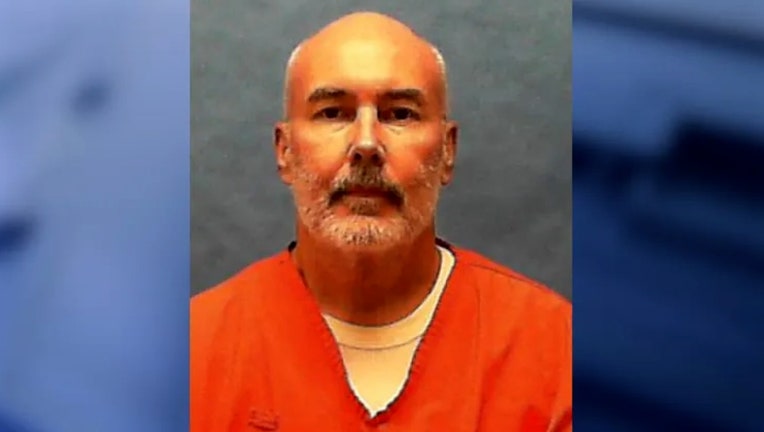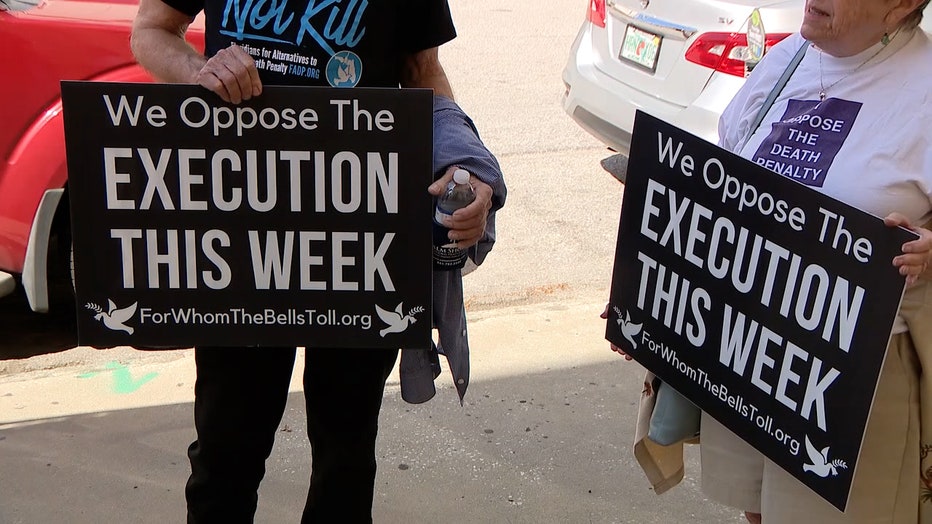Donald Dillbeck will die by lethal injection Thursday after Supreme Court declines to block Florida execution

Booking image for Donald Dillbeck (Florida DOC0
TALLAHASSEE, Fla. - Despite efforts by Donald Dillbeck's attorneys and death penalty protesters, Florida will move forward with executing the man who murdered a Tallahassee woman back in 1990. It will be the state's first execution since 2019.
Last month, Governor Ron DeSantis signed a death warrant for 59-year-old Dillbeck who was convicted of fatally stabbing a woman during a carjacking at a Tallahassee mall in 1990. His execution is set for Thursday which is why Death Penalty Action traveled the state earlier week to raise awareness against executions.

It comes as House Bill 555 makes its way through the legislature, which, if passed, would allow death sentences if eight jurors agreed. Currently, state law requires a unanimous decision.
"Why kill people who kill people to show Americans killing people is wrong?" Journey of Hope Co-Founder SueZann Bosler told FOX 13 earlier this week.
Dillbeck will be the state's first execution since Gary Ray Bowles was put to death in June 2019 and the longest the state has gone without carrying out an execution since 1983.

Calls to stop the death penalty in Florida
Protesters are asking Governor Ron DeSantis to eliminate executions as the state pushes to make it easier for a jury to sentence someone to death.
The murder of Faye Vann
In 1990, Dillbeck was serving a life sentence for the death of Lee County Deputy Lynn Hall in 1979. Officials said he escaped while participating in an off-site vocational program in Quincy.
He bought a knife while walking to Tallahassee in the next county over, then stabbed Vann in a shopping mall parking lot and took her car, according to court records. He crashed nearby before being caught. Vann was waiting in the car alone while her family shopped.
He had served 11 years of a life sentence after being convicted of killing Hall. According to court records, Hall had approached Dillbeck in a Fort Myers beach parking lot and Dillbeck ran away. When Hall caught up to him, Dillbeck grabbed Hall’s gun and shot him twice. Dillbeck confessed to the murder, according to the governor’s office.
Florida's death penalty history
In Florida, where 301 people are currently on death row, an execution date is set by the governor, who signs a death warrant. By comparison, in Texas — the nation’s most active death penalty state — a court determines execution dates.
Since the U.S. Supreme Court reinstated the death penalty in 1976, Florida has been one of the most active states in carrying out executions.
DeSantis has criticized a Broward County jury’s decision not to sentence Nikolas Cruz to death for fatally shooting 17 students and faculty at a Parkland high school, but otherwise has been quiet when it comes to capital punishment after two executions during his first year in office.

Jury sentences Parkland shooter to life in prison without parole
The jury foreman in the Parkland shooter trial said three of the jurors ultimately voted to sentence Nikolas Cruz to life in prison, with one juror being a "hard no" on the death penalty and another two ultimately choosing to vote against it as well.
By comparison, his immediate predecessor, current U.S. Republican Sen. Rick Scott, oversaw 28 executions. Since the U.S. Supreme Court reinstated the death penalty in 1976, Florida has been one of the most active states in carrying out executions.
Democratic Gov. Bob Graham oversaw 16 executions between 1979 and 1987. Republican Gov. Bob Martinez oversaw nine in his one term in office, Democratic Gov. Lawton Chiles oversaw 18, and 21 prisoners were executed under Republican Gov. Jeb Bush.
"The signing of the death warrants and the death penalty execution was one of the most difficult parts of the job," Bush said in an email to The Associated Press during DeSantis’ first term in office. "It was draining in every way. I never felt comfortable doing it, but I was duty bound to do so."
The Associated Press contributed to this report

